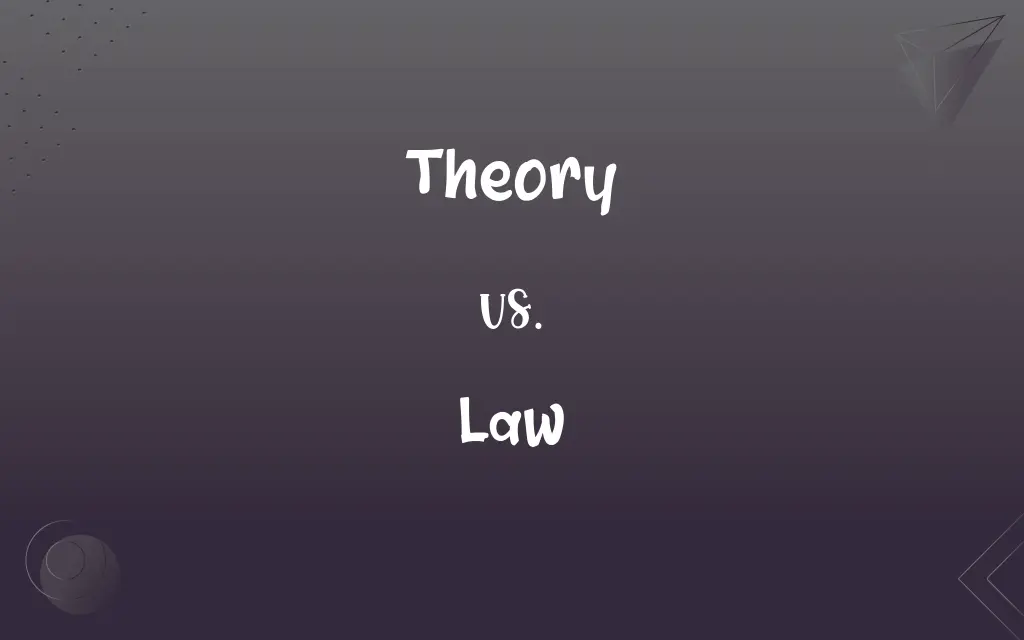Theory vs. Law: What's the Difference?
Edited by Aimie Carlson || By Harlon Moss || Updated on October 15, 2023
A theory is a well-substantiated explanation based on evidence. A law describes consistent and universal relationships observed in nature.

Key Differences
In the realm of science, a theory is a well-substantiated explanation of some aspect of the natural world. It's built upon a foundation of repeatedly tested hypotheses and has stood up to scrutiny and further testing over time. On the contrary, a law is a statement that describes consistent and universal relationships observed in nature. Laws are often expressed mathematically, detailing how specific variables interact under specific conditions.
Theories offer a framework for understanding the mechanisms behind observed phenomena. They can change or be refined as new evidence emerges, ensuring the theory remains aligned with current observations. Laws, however, don't delve into the "why" or "how" of a phenomenon. Instead, they simply detail the consistent relationships that occur without explaining the underlying cause.
For example, in biology, the theory of evolution by natural selection explains the mechanism by which species change over time. This theory has been built upon a vast amount of evidence from various scientific disciplines. In contrast, Newton's law of universal gravitation is a mathematical relationship describing the attraction between two objects with mass, without detailing why this attraction occurs.
It's also important to understand that in everyday language, the term "theory" might be used to denote a guess or speculation. However, in the scientific context, a theory has much greater weight, indicating a deep and broad understanding supported by evidence. Laws, in both scientific and everyday contexts, indicate consistent patterns or rules, but in science, these patterns are always based on empirical observations.
While both theories and laws are crucial to scientific understanding, they serve distinct roles. Theories provide comprehensive explanations, while laws describe consistent, observable patterns in nature.
ADVERTISEMENT
Comparison Chart
Nature
Explanation based on evidence
Statement of consistent and universal relationship
Describes
Mechanisms and reasons
Observed patterns
Subject to Change
Can be refined with new evidence
Typically stable but can be redefined in new contexts
Example
Theory of evolution by natural selection
Newton's law of universal gravitation
General Interpretation
Deep understanding in scientific context, guess in everyday
Consistent pattern in science, rule or regulation in everyday
ADVERTISEMENT
Theory and Law Definitions
Theory
A system of ideas intended to explain something.
Darwin's theory of evolution offers insights into the diversity of life.
Law
A rule defining correct behavior or procedure.
The laws of chess determine how each piece moves.
Theory
A well-substantiated explanation of an aspect of the natural world.
The theory of relativity changed our understanding of time and space.
Law
A statement of fact detailing a consistent and universal relationship in nature.
Newton's third law states that every action has an equal and opposite reaction.
Theory
An idea used to account for a situation or justify a course of action.
My theory is that he forgot about the meeting.
Law
The body of rules imposed by an authority.
International law governs the relations between nations.
Theory
A set of principles on which an activity or process is based.
The theory behind this method is sound.
Law
A system of rules recognized by a community or nation.
The law prohibits theft.
Theory
An abstract thought or speculation.
It remains a theory until proven.
Law
A particular branch of knowledge or study.
He decided to study criminal law.
Theory
A set of statements or principles devised to explain a group of facts or phenomena, especially one that has been repeatedly tested or is widely accepted and can be used to make predictions about natural phenomena.
Law
A rule of conduct or procedure established by custom, agreement, or authority.
Theory
The branch of a science or art consisting of its explanatory statements, accepted principles, and methods of analysis, as opposed to practice
A fine musician who had never studied theory.
Law
The body of rules and principles governing the affairs of a community and enforced by a political authority; a legal system
International law.
FAQs
Are laws unchangeable in science?
Laws describe observed patterns, but understanding can evolve with new discoveries.
Is the theory of gravity the same as the law of gravity?
No, the theory explains the mechanism, while the law describes the observed relationship.
Why are theories important in science?
Theories provide frameworks for understanding and predicting phenomena.
Is a theory just a guess in science?
No, in science, a theory is a well-substantiated explanation based on evidence.
Can laws explain why something happens?
Laws describe consistent relationships but don't explain the underlying cause.
Are laws always mathematical in nature?
Many scientific laws are mathematical, but not all are expressed this way.
Does a scientific law tell you how to do something?
No, it describes consistent relationships but doesn't provide instructions.
Can theories be based on laws?
Yes, laws can be part of the evidence that supports and shapes a theory.
Why can't theories turn into laws?
Because they serve different purposes; theories explain, laws describe.
How are theories developed?
Through the accumulation and evaluation of evidence from repeated testing.
Can theories be proven?
Theories are supported by evidence but are open to refinement with new data.
Is the word "theory" used differently in daily language?
Yes, in everyday language, it often means a guess or speculation.
Do all scientific disciplines have laws?
Many do, but not all phenomena can be described by simple, consistent laws.
Is a law higher than a theory in science?
Neither is "higher"; they serve different but complementary roles.
Can a law become a theory?
No, they serve different roles. Laws describe patterns, theories explain mechanisms.
Do laws in science apply everywhere?
Scientific laws describe universal patterns observed in nature.
Can a law exist without a theory behind it?
Yes, laws can describe patterns without an accompanying theory to explain them.
Why don't laws explain the "why" behind phenomena?
Laws focus on consistent patterns, leaving the explanations to theories.
How does a hypothesis differ from a theory?
A hypothesis is a testable prediction, while a theory is a substantiated explanation.
Can a theory be widely accepted but later disproven?
Yes, theories can be refined or replaced as new evidence emerges.
About Author
Written by
Harlon MossHarlon is a seasoned quality moderator and accomplished content writer for Difference Wiki. An alumnus of the prestigious University of California, he earned his degree in Computer Science. Leveraging his academic background, Harlon brings a meticulous and informed perspective to his work, ensuring content accuracy and excellence.
Edited by
Aimie CarlsonAimie Carlson, holding a master's degree in English literature, is a fervent English language enthusiast. She lends her writing talents to Difference Wiki, a prominent website that specializes in comparisons, offering readers insightful analyses that both captivate and inform.































































